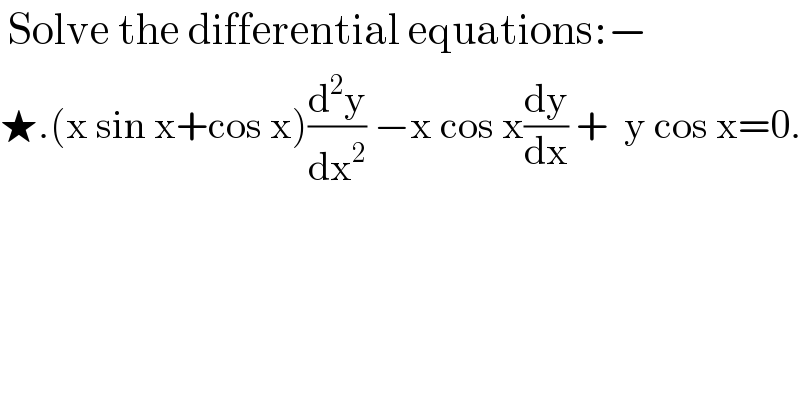
Question and Answers Forum
Previous in Differential Equation Next in Differential Equation
Question Number 95119 by Mr.D.N. last updated on 27/May/20

Answered by niroj last updated on 23/May/20
![2. (x sin x + cos x )(d^2 y/dx^2 ) − x cos x (dy/dx) + y cos x=0 Sol^n : (d^2 y/dx^2 ) − ((x cos x)/(x sin x+cos x)) (dy/dx) + ((cos x)/(x sin x+cos x)) y=0 We know the form of variable coefficient with constant If Part of CF is known,then we can use of special cases: (d^2 y/dx^2 )+P(dy/dx)+Qy =R.. Let, P= − ((x cos x)/(x sinx+ cos x)) Q= ((cos x)/(x sin x+cos x)) and R=0 ∴P+Qx=0 −((x cos x)/(x sin x+cos x)) + ((x cos x)/(x sin x+cos x))=0 If P+Qx=0, then part of CF u= x y=uv y=xv....(i) Special case: (d^2 v/dx^2 )+(p+(2/u)(du/dx))(dv/dx)=(R/u) (d^2 v/dx^2 )+(−((x cos x)/(x sin x+cos x)) + (2/x))(dv/dx)= (0/x) Put , (dv/dx)=t ⇒ (d^2 v/dx^2 )= (dt/dx) (dt/dx) +((2/x) − ((x cos x)/(x sinx+cos x)))t=0 IF= e^(∫ ((2/x) − ((x cos x)/(x sinx+ cos x)))dx) = e^((2log x −log (x sin x +cos x)) = e^(log x^2 ) .e^(log (x sin x +cos x)^(−1) ) = x^(2 ) . (1/(x sin x +cos x)) t. (x^2 /(x sin x+cos x)) = ∫ (x^2 /(x sinx+cos x)).0 dx+C_1 t (x^2 /(x sinx+cos x)) = C_1 t = ((x sin x+ cos x)/x^2 )C_1 (dv/dx) = ((x sin x+cos x)/x^2 )C_1 ∫ dv = C_1 ∫ ((xsin x+cos x)/x^2 )dx (x sin x+cos x)(d/dx) sinx+xcosx−sinx =xcos x ∫dv = C_1 [ (xsinx+cos x)∫(1/x^2 )−∫{(xsinx +cos x)(d/dx)∫(1/x^2 )dx}dx v= C_1 [ −(x sinx+cos x)(1/x) +∫xcos x(1/x)dx +C_2 v= C_1 [−(xsin x+cos x)(1/x)+sinx]+C_2 put value of v in eq^n (i) y= xv =C_1 [−x(x sinx+cos x)(1/x)+x sin x]+C_2 x = C_1 [ −xsinx −cos x+ x sinx]+C_2 x =− C_1 cos x+C_2 x ∴ y = −C_1 cos x+C_2 x ∴ y Whis is required differential equation.](Q95135.png)
Commented by Mr.D.N. last updated on 23/May/20
outstanding aspect ����������
Commented by i jagooll last updated on 23/May/20
coll man. ������
Commented by niroj last updated on 23/May/20
����
Commented by peter frank last updated on 24/May/20

